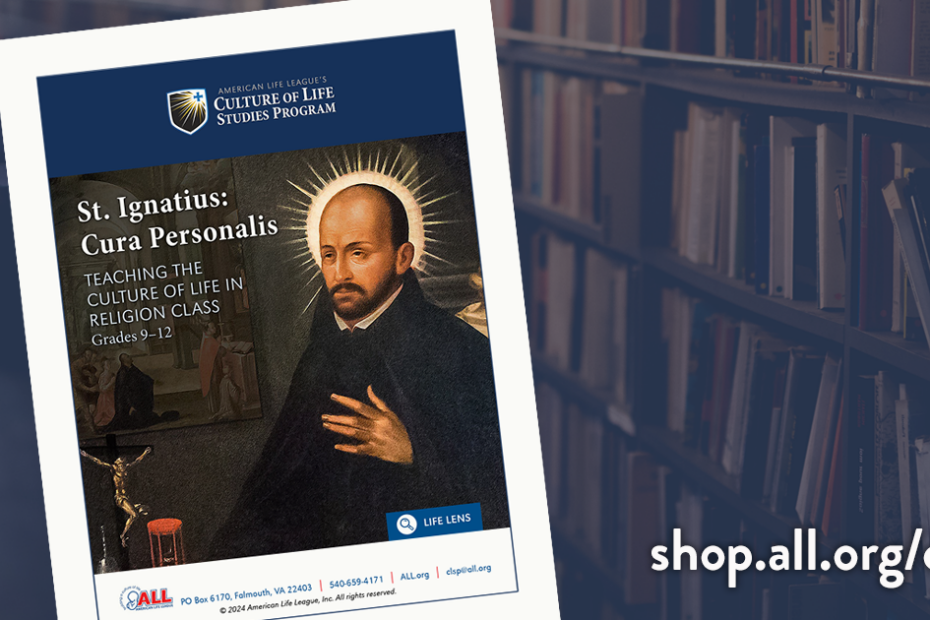By Teresa Ruiz
The following article is from a high school senior who read our lesson on St. Ignatius and cura personalis (care for the whole person) and found that it also applies to those living in poverty. She hopes to help readers understand that caring for the whole person means also caring for the needy.
Cura personalis, as conceptualized by the teachings of St. Ignatius of Loyola, serves as a reminder to our modern-day world to find value in caring for ourselves and others in the same way we find value in praising God. In a new high school lesson entitled St. Ignatius: Cura Personalis, the Culture of Life Studies Program outlines what exactly it means to “care for the whole person”—body, heart, mind, and soul.
The concept of cura personalis can be easily applied when acknowledging how to aid and show compassion toward people who are experiencing poverty. Poverty appears in many different forums. Many may simply picture people who are experiencing homelessness, but in fact those experiencing poverty can be missing the necessities to adequately participate in society at many different levels due to things such as lack of income or access to resources.
Within modern culture there are many misconceptions, created by an ultimate lack of knowledge, surrounding people who are living in poverty. In this Ignatian lesson, the Culture of Life Studies Program explores the idea that “to grow in a relationship with the Lord requires a growth in knowledge.” This is likewise with those living in poverty. We must first learn their story before we make judgments or consider ourselves to “know” enough to place people within stereotypes.
People who are experiencing poverty are often quickly judged by those who live in a position of privilege. Saint Teresa of Calcutta is a perfect example of taking the time to love others without judgment or bringing in any negative predispositions. The way in which we should take the time to get to know God and learn from Him is the same way we should take the time to know other people, as each person has God within them. To care entirely for people who are living without homes or who are poverty stricken in other ways entails learning why they are in their situations. Hearing people’s backgrounds and understanding their needs and why they are having difficulty finding help or moving out of poverty is what it means to become knowledgeable about others in order to fully show love.
Caring for the entire person is crucial because it recognizes the way in which God lives in each and every person. Truly serving others involves recognizing the immense value others have regardless of differences in status, appearance, or otherwise.
In the second day of the lesson, the Culture of Life Studies Program narrows in on the idea of a “live and let live” mentality and the negative effects this can have on others. It can be interpreted that this idea expresses dismissal of other people by signaling a lack of care about their well-being. So long as those who are in the positions of privilege are unaffected, why should any attention be paid to actions and sufferings of people who are living in positions of poverty? The lesson states the answer to this question beautifully when it says, “Our universal truths include the facts that all humans have dignity and are made in the image and likeness of God and that we have immortal souls and will be judged by our actions here on earth.”
Our actions influence the ways in which other people view our faith. Attention should be given to all people because all people are designed to thrive in a community, and all have value. Each person has the ability to truly care for another person.
It is ultimately the sincerity of our actions that matters. We must learn to love one another in the way Saint Ignatius calls us to. Cura personalis encourages caring for people by respecting them, listening to and learning their backgrounds, and also being generous of ourselves. In order to care for the entire person, the entire person must be acknowledged with sincerity of love as we would aim to love God.
Teresa Ruiz is a senior in the International Baccalaureate program at a Florida high school. She plays volleyball and softball and is president of her senior class. Teresa attended the Summer Scholars program at the University of Notre Dame in June, where she took a course on “Confronting Poverty: Bringing Service to Justice” and hopes to increase awareness about those living in poverty and how we should care for them.
